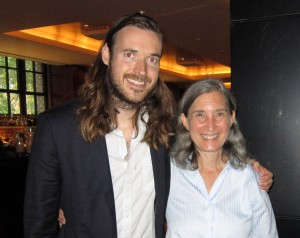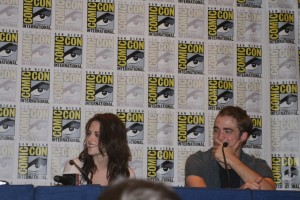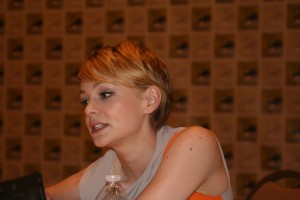Interview: Mike Cahill and Brit Marling of ‘Another Earth’
Posted on July 22, 2011 at 10:27 pm
Mike Cahill and Brit Marling co-wrote “Another Earth.” He directed, shot, and edited, and she stars as Rhoda, a gifted teenager who makes a tragic mistake. Driving home after a party, she causes an accident that kills a young mother and her son and injures the father, a professor of music, played by William Mapother (“In the Bedroom” and “Lost”). When she gets out of prison, she goes to see him to apologize, but when he answers the door she loses her nerve. She tells him she is there to offer a trial house-cleaning service, and ends up going back every week.
Meanwhile, another planet has been discovered that looks exactly like earth, and an industrialist is planning to take an expedition to see if it is really an exact parallel.
It is an extraordinarily accomplished film and I was delighted to get a chance to speak with Mike and Brit.
Mike Cahill
What was it like to have your movie premiere at Sundance?
 It was a dream come true, so much fun. It was interesting to have this little baby and release it to the world there. The programmers are so cool and thoughtful. I loved every moment.
It was a dream come true, so much fun. It was interesting to have this little baby and release it to the world there. The programmers are so cool and thoughtful. I loved every moment.
And what has been the reaction now that it is about to be released?
It’s been positive. The Q&A’s have been one of my favorite things. There’s always something new that comes out of them. They haven’t been repetitive.
William Mapother is extraordinary in the film. How did he work with you on creating his character?
I loved how in “In the Bedroom” he had such a fully realized character. He had this intensity and intimidating screen energy that was wonderful because I could harness that for the beginning of his arc, and then as his character develops, we could crack that open and this joyous light that he does have inside could shine through and it would be really beautiful. He read the script, we talked for two hours on the phone and he said, “I’m in.” What was great was that he really dug into his character. I really wanted to have rehearsals with Brit and he was very generous to give us two weeks. We would meet every day at his house in Los Angeles and read the script and get on our feet and work through scenes. I wanted to create an atmosphere that was very free and open for collaboration. Because both Brit and William cared so deeply and did so much homework, their ideas about how things would unfold were very important to me. So almost in a Mike Leigh way we would just freeform and feel it out. We didn’t change too much but we did add a few scenes and tweak a little bit of dialog and subtract some things. It was really organic and freeing and really helped me. When someone enters the room who is living from the POV of their character so deeply, and you can tell that they’ve done that hard work of imagining the childhood, the lifelong experience prior to the first frame of the film, they have that passion for the project and what they are bringing is really valuable.
There’s a moment where he’s parked outside her house. She comes over to the car and William said, “My character would ask her to come around the other side because he’d be scared of traffic, right?” One little line, one little idea, yet so meaningful about that person’s life and experience. One extra beat in the film but it adds a great deal of authenticity.
One thing that surprised me about the film is how expensive it looks because I know you made it for very little money. If you had another million dollars in the budget, what would you have spent it on?
Better craft services! I think the budgetary constraints are a gift to the artist. Your mind has to be creative in different ways and it opens up different channels and makes you think of interesting solutions. I wouldn’t change it. I’d pay everyone more if I had more money but that’s it.
One of my favorite scenes is when the earth scientist communicates with her counterpart on the other planet. It was really well done.
That was inspired by the moon landing. The everyman and everywoman experience of watching it on television, and all these people walking out of their houses and looking up at the moon. I took those stories and said, we’re not the hundred million dollar Hollywood movie, where you can show the spacecraft landing. We’re telling the story of the people who watch what is happening on television. And somehow there is a power and connection because it affects everyone. And that moment when she realizes she is talking to herself in a way worked on the page, in rehearsals, right from the beginning. The performance by Diane Cielsa was wonderful, so specific.
Tell me about your ideas on the look of the film.
There were certain colors that were very important. In the first ten minutes of the film, Rhoda has this red dress and it’s the only time we see red. It was symbolic of her energy and vitality. Later we only see it with the two things that remind us of John’s past, his child’s robot and his wife’s sweater. Other than that, it’s all blue, gray, very drab. All of it reflects the story. As their relationship begins to blossom, the colors warm up. As he gets his life back, he begins to dress like the man he was. We wanted it to be subtle but enough to inform the story.
You mentioned Mike Leigh. What other film-makers have inspired you?
Julian Schnabel’s film, “Basquiat” made me want to make films. I’d always been interested in film but it was my hobby. There was something about the way he made the film, so freeing, breaking convention in an artful way, it is poetry. Then I became obsessed! And I love Krzysztof Kieslowski, the way his films are based in realism but with something magical underneath.
You didn’t study film at Georgetown. You studied economics.
With economics, you understand incentives, opportunity costs, efficiency, all vital elements to making a film and living life!
Brit Marling
Mike told me about how closely you worked with William Mapother on your characters and their relationship. What was that like for you?
The moment he signed on was the moment we had a movie. Mike and I had both seen his work in “Lost,” and when the casting director recommended him, and we were like, “He’s perfect! The part seemed so right for him.” He has such a gravitas on screen. No one else could have filled out the part the way he did. He has this intense energy and this very deep romantic side. He is really thorough at how he approaches the character, which is really inspiring. He thinks of every date, the times, the season, what it has been like to be on these medicines, what he is still taking, how that is affecting him. It feels very real because he’s done his homework. He also showed us that Rhoda and John needed a bit more time to come together. He said, “I wouldn’t open up that quickly. It’s going to take a few goes.” We added more time, more breath into that and it felt more natural.
How do you as a screenwriter learn from your experience as an actress or the other way around?
When you begin the acting part of it, you’ve done a lot of the homework for the part through the writing. You have spent so much time daydreaming and imagining Rhoda from a writing perspective that when you put on the actor hat you have already thought through quite a bit of the story. You’re always trying to say the most through the fewest number of scenes and the least dialog. The power of cinema is not auditory — someone once told me a play is 80 percent auditory and 20 percent visual and a film is the reverse. You’re really thinking of everything as part of the whole. How do you get to the heart of the relationship between two people in three scenes as opposed to five? How can you keep whittling it away to get to the center of emotion?
You set a challenge for yourself as an actress in creating a character who does so much internally, very subdued. You had to convey a lot through expression rather than dialog.
I didn’t really notice because when you’re in it, you feel like it is deafeningly loud. The emotions are like nuclear bombs and fireworks are going on inside you, the sight of his house — you don’t say anything because you don’t need to. What could you possibly say?
Rhoda is befriended by a janitor who takes a shocking and tragic step. Tell me about his contribution to the story.
We felt that both John and Rhoda really needed to be disconnected from other people. That’s why the connection they find in each other is so important. But we also liked the idea of someone who has a foil or a mirror to Rhoda who is also suffering tremendous grief. You don’t find out why but you don’t need to. They recognize in each other the symptoms of grief. And in the way he hurts himself, you feel that potential danger for her, too. You see what that intensity of internal suffering can cause.
What does the element of science fiction, which is underplayed but important, add to this film?
I love “Twelve Monkeys,” the power of that final scene. There is something about science fiction that can get to the ineffable things that we feel but cannot explain, the way we feel connected to each other and to alternate versions of ourselves. We can’t articulate that yet through science. Are there an infinite number of mes talking to an infinite number of yous? Science fiction, like spirituality, gives us a vocabulary, a poetry, a breath, to get to the unsayable things.




